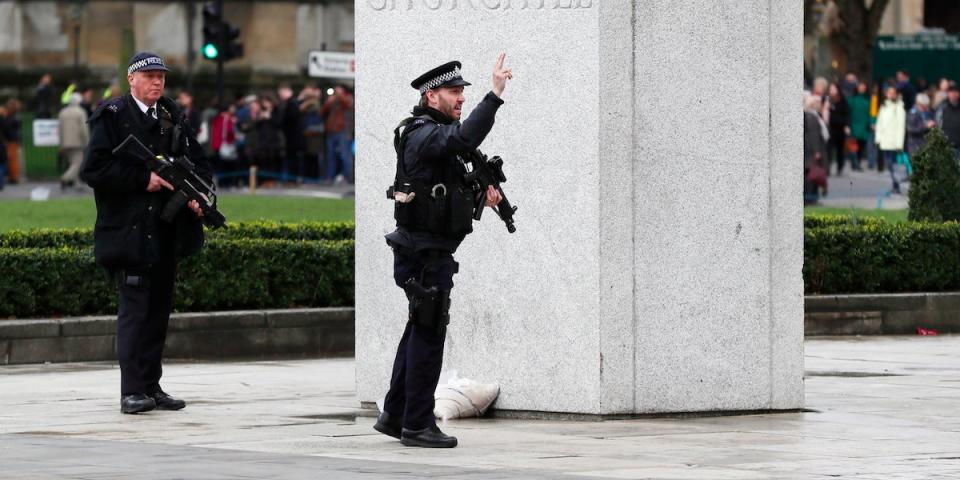PC Keith Palmer's death sparks questions over whether all parliamentary police should be armed

Met Police
LONDON — PC Keith Palmer, the police officer killed in Wednesday's terror attack in Westminster, was unarmed.
Palmer was stabbed as he rushed to confront the knife-wielding attacker, moments before armed colleagues shot and killed the suspect.
MP and former Conservative leader Iain Duncan Smith has now questioned why there was not an armed presence at the gates where the incident took place, and said it was a "little bit of a surprise that there was not."
So why was PC Palmer unarmed?
What police carry
Most police officers in the UK do not carry a firearm, as senior officers want forces to retain a "respect and consent" policy which could be undermined by the widespread use of weapons.
However, PC Palmer was a member of the Parliamentary and Diplomatic Protection Command (PaDP), a special operations branch of the London Metropolitan Police Service responsible for protecting UK embassies, diplomats, and the parliamentary estate.
The unit is an armed command, meaning that most of its officers are "authorised firearms officers" (AFOs). Firearms commonly carried by officers include the Glock 17 pistol and the Heckler & Koch MP5 submachine gun.
But not all PaDP officers carry weapons on duty. The Metropolitan Police's Acting deputy commissioner Mark Rowley said in a statement on Wednesday:
"Our parliamentary protection team are a combination of armed and unarmed officers doing different roles, and sadly the officer who lost his life today was unarmed.
"He was supported by armed colleagues who shot and killed the attacker. [The attacker] tried to enter parliament and was stopped at the gate."
BBC political editor Laura Kuenssberg reported that Defence Secretary Michael Fallon's bodyguard may have been the officer responsible for shooting the attacker dead.
The Defence Secretary, Home Secretary, Foreign Secretary, and Northern Ireland Secretary are all assigned Specialist Protection Command (SO1) close protection officers, who carry firearms.
Rowley did not specify why Palmer was not carrying a gun, or why there was not an armed presence at the gates which the attacker attempted to breach.
Armed response units responded swiftly

Stefan Wermuth / ReutersAs well as the armed PaDP officers who were already present at the scene of the attack, a number of Metropolitan Police counter-terrorism armed response units flooded the area around Westminster on Wednesday.
The response by emergency services was widely praised for its speed and preparedness. BBC home affairs correspondent Dominic Casciani said: "The fact that the Metropolitan Police's counter-terrorism armed response swung into action so quickly indicates how much work has been done since the killing of Lee Rigby in 2013."
At present, there are around 2,200 armed police officers within the Metropolitan Police, with another 600 currently being trained. Most armed units are deployed in response to specific events or to carry out specific firearms operations rather than for routine patrols.
Stepping up police patrols

Stefan Wermuth / ReutersExtra armed police officers have been deployed across London in the wake of the attack. The Metropolitan Police, British Transport Police, and the City of London Police all confirmed on Wednesday that more officers are currently on patrol.
Rowley said in a statement: "On a precautionary basis across the country we are stepping up police patrols – unarmed and armed – and the public will see far more of their local police forces over the forthcoming days, particularly in crowded places and iconic locations."
What next?
Prime Minister Theresa May told the House of Commons on Thursday morning that security around the parliamentary estate would be reviewed as a matter of routine.
She said: "In terms of security here in Westminster, we should be clear first of all that an attacker attempted to break into parliament and was shot dead within twenty yards of the gate.
"If his intention was to gain access to this building, we should be clear that he did not succeed. The police heroically did their job.
"But as is routine, the police — together with the house authorities — are reviewing the security of the parliamentary estate, co-ordinated with the cabinet office, who have responsibility for the security measures in place around the government's secure zone."
Defence Minister Michael Fallon also confirmed that all security at the Houses of Parliament will be reviewed, including whether police on the front gates should be armed or not. He paid tribute to PC Palmer, who he said had "made the ultimate sacrifice" to keep others safe by stopping the attacker breaching the gates at Parliament.
NOW WATCH: Trump appears to ignore requests for a handshake with Angela Merkel during their first meeting
See Also:
SEE ALSO: Police officer killed in Westminster terror attack named as PC Keith Palmer

 Yahoo News
Yahoo News 

